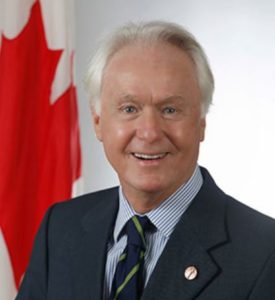Why Ottawa should go slow on Bill C-69

Senator Doug Black.

By Peter Kennedy
Despite recent setbacks, Alberta Senator Doug Black believes the Trans Mountain Pipeline Expansion Project will ultimately be approved. However, he fears that getting major resource projects approved in Canada will remain an uphill battle, especially if there are no amendments to Bill C-69.
Black says the Canadian Government would not have had to pay $4.5 billion to acquire the oil pipeline project from Kinder Morgan Canada [KMI-TSX] if Ottawa had approved a proposed bill that would have recognized Trans Mountain as being in the national interest and critical to the future prosperity of Canada’s economy.
“If that legislation had been passed, it would have provided the legal comfort needed by Kinder Morgan and the government of Canada would not have had to buy this pipeline,” he said during a telephone interview with Resource World. “If we had passed this months ago, we could have saved Canada $4.5 billion.”
On August 30, 2018, the day that Kinder Morgan shareholders approved the sale of the $7.4 billion Trans Mountain Pipeline Expansion, a Federal Court of Appeal quashed the approval of the project on the basis that Canada’s efforts to meaningfully consult with indigenous people fell short.
When the ruling was announced, the court also criticized the lack of attention given to how increased tanker traffic off the cost of British Columbia would affect the resident killer whale (orca) population.
“I think Trans Mountain will ultimately get approved,” said Black. “But it will not be approved until after the next [Federal] election is my guess.” Black said this is because the consultation process that the government has now mandated involves consultations with 117 Indigenous groups with no timeline for completion.
“It will not be developed within the timeline that Alberta wants to see and Canada wants to see,” he said. “Trans Mountain is stalled.”
The original Trans Mountain Pipeline was built in 1953 and continues to operate today. The proposed expansion is essentially a twinning of the existing 1,150-kilometre pipeline between Edmonton, Alberta and Burnaby, British Columbia.
Expected to cost approximately $7.4 billion, it will create a pipeline system with a nominal capacity rising from 300,000 barrels per day to 890,000 barrels per day.
Meanwhile, Black says he remains concerned about the impact of Bill C-69, the federal legislation that aims to overhaul the process by which energy projects are reviewed. He said those concerns are shared by key members of British Columbia’s business community.
Bill C-69, which is under consideration in the Senate, would create a new Impact Assessment Agency and replace the National Energy Board with the Canadian Energy Regulator. It introduces new timelines and specific steps that companies and governments will need to take in order for new energy projects to proceed.
“The folks that I talked to are extraordinarily concerned about the ramifications of Bill C-69,” he said. “They are concerned that the legislation is flawed and that we run the risk of not getting resource projects approved on a go-forward basis.”
Black said panels that are constituted to assess the merits of a particular project are asked to focus exclusively on consultation matters and on the environment. Therefore, he says a decision maker doesn’t need to consider whether a project is economically good for Canada or whether it creates jobs. As a result, there is no mandate to achieve a meaningful balance between responsible resource development and other factors.
Black says Bill C-69 is also flawed for political reasons. “You go through this lengthy process of approval, spend time and money and then at the end of the day, The Federal Minister of the Environment has the ability to decide whether the project advances or not,” he said. “That is just way too uncertain for anyone to get their mind around.”
As a result, he said substantial amendments are needed before Bill C-69 is passed into law.
“Natural resources are the family business of Canada and we have to make sure they are responsibly developed for the good of the Nation,” Black said. “[We don’t want to be] creating a situation where people feel that the country is closed for business, or that we can’t do business here.”
Black said it is worth remembering that t it took eight years for the LNG Canada consortium to give the green light to a $40 billion megaproject that aims to export liquefied natural gas to Asia from a port on the west coast of British Columbia.
It has taken tax relief from the governments of British Columbia and Ottawa to persuade the LNG Canada consortium to commit to an investment decision. “I would also point out that the time it has taken Canada to approve one LNG project 29 other projects have been approved around the world,” he said.
During a recent trip to B.C., Senator Black said he met with representatives of the Port of Prince Rupert and Independent Contractors and Business Association of British Columbia (ICBA).
Based on those discussions, he says he is not alone in taking the view that Bill C-69 needs to be revised before it becomes the law and that Ottawa should spend more time consulting with affected parties.
“Let’s take the time that is necessary to consult appropriately with interests that need to be consulted,” he said.
